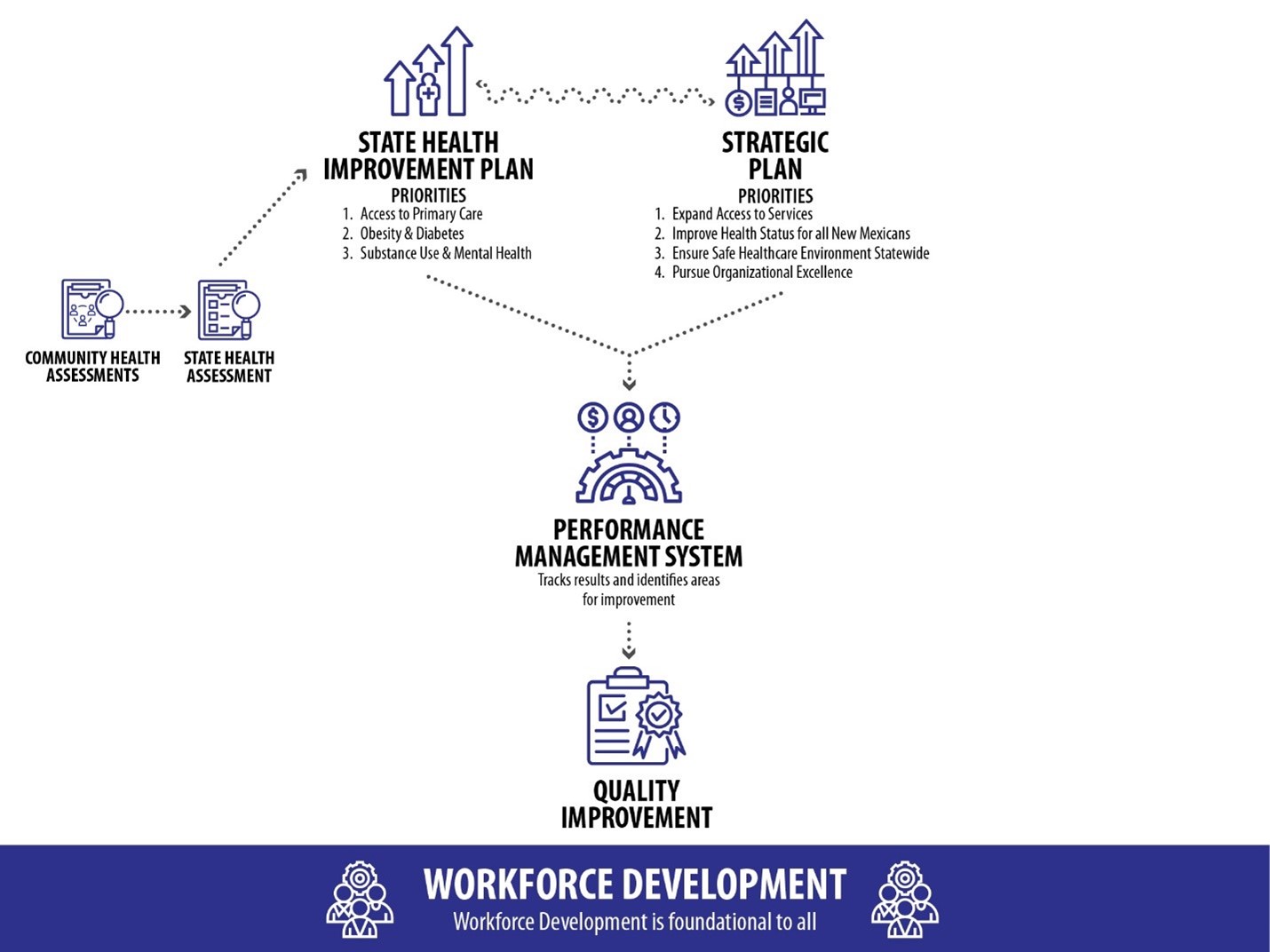Planning and Assessment
With PHAB’s push toward defined expectations and best practices, the Accreditation Board outlines the consistent application of key components that should be a blueprint for a nationally recognized and accredited health department. The interlocking planning, assessment and operational components provide standards and measures that ensure a health department’s ability to deliver the ten essential public health services and sets the context for organizational excellence, which NMDOH is solidifying as an infrastructural framework.

Community Health Assessments (CHA)'s – Local and county level assessments that identify key health needs and issues through a systemic, comprehensive data collection process.
The planning and assessment model begins with community health assessments at the local and county level. These assessments identify key health needs and issues through a comprehensive data collection process. Ideally, community health assessments should directly inform NMDOH’s State of Health in New Mexico report, which is an overall state health assessment.
State Health Assessment (SHA) – An evaluation of New Mexico’s population health status. A big picture perspective gleaned from a variety of data sources that paints the current health of New Mexico as "it is."
The state health assessment evaluates New Mexico’s various populations and reflects the big picture of our current state of health in NM by compiling and analyzing various datasets, such as the community health assessments, NMDOH’s Indicator-Based Information System, the Community and Health Systems Epidemiology Bureau’s Hospital Inpatient Discharge Data, Emergency Department data, and the developing All Payers Claims Database, etc.
State Health Improvement Plan (SHIP) – A long-term plan addressing the state of health "to be". The SHIP takes the assessment, multiple data sources and stakeholder input, including those of sovereign nations, to ascertain the top population-based health priorities for New Mexico and develops strategies for the state and tribal leaders to tackle those priorities. The SHIP goes beyond the Department’s scope and ideally should act as an inter-agency statewide strategic health improvement plan.
A long-term plan addressing the state of health "to be". The SHIP takes the assessment, multiple data sources and stakeholder input, including those of sovereign nations, to ascertain the top population-based health priorities for New Mexico and develops strategies for the state and tribal leaders to tackle those priorities. The SHIP goes beyond the Department’s scope and ideally should act as an inter-agency statewide strategic health improvement plan.
Strategic Plan – A 3-year plan, with department goals, objectives, strategies, etc. that informs how the agency will act and which direction it will go. It drives internal best practices that align with carrying out the SHIP and the state of health because it fundamentally guides the department’s action, steers it along top priorities, and outlines effective management practices, which then assist the agency in fulfilling its mission and vision most effectively.
The SHIP works in tandem with the strategic plan, but the strategic plan is department specific and guides the department’s direction for a three-year period. The strategic plan is fundamental to the department achieving its key objectives and identifying best practices.
Performance Management System – A system to monitor and show progress toward expected programmatic outcomes. Ideally, the measures should be strategic in nature and determined by the organizational strategic plan’s objectives and activities as well as the State Health Improvement Plan priorities.
NMDOH has established a performance management system that goes beyond New Mexico’s Accountability in Government Act (AGA) requirements by determining internal programmatic performance measures as well as statewide population-based indicators and inter-agency strategies via the SHIP. While the AGA measures represent both SHIP and strategic plan priorities, there are areas where it is necessary to monitor and track administrative and operational effectiveness and progress. Ultimately, each division should be strategically aligned with the department’s overall strategic plan by determining suitable internal objectives, corresponding performance measures and programmatic workplans.
Quality Improvement – A problem solving process rooted in the application of various tools that, when utilized, looks at the root cause of the problem and identifies ways to make sustained system change improvements.
A well-functioning performance management system should reveal areas for improvement to NMDOH leadership. When targets are not met or the expected results fall short, the department’s quality improvement system is designed to assist with determining solutions to identified problem areas through targeted quality improvement projects, workforce development, and training.
Workforce Development – Operational and training practices that build employee competency based in the knowledge, skills and attitudes (KSAs) necessary to do their jobs and are used to develop and assess the next generation of the public health workforce.
Workforce development helps create, sustain, and retain a viable and competent public health workforce. NMDOH is committed to continually improving the workforce’s competency to support the mission of creating a healthier New Mexico.
Overall, these interrelated components push NMDOH to continuously review and work toward systematic alignment and high performance. With a comprehensive strategic plan, a highly institutionalized performance management system, a data driven analysis of New Mexico’s health status, and the regular determination of state health priorities, NMDOH will continually advance a culture of quality and performance and deliver results to the people of New Mexico.

